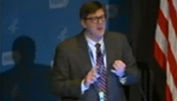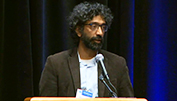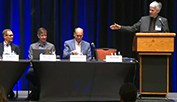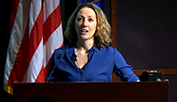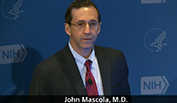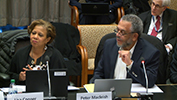-
- NIH VideoCast - Demystifying Medicine 2017: Mitochondria, Aging, and Chronic Disease
-
- - Richard Hodes, MD, NIA, NIH and Toren Finkel, MD, PhD, NHLBI, NIH (2017/01/12)
- - Category : Demystifying Medicine
- The Demystifying Medicine Lecture Series is designed to help bridge the gap between advances in biology and their applications to major human diseases. Each lecture will feature a presentation on a major disease, including current research and advancements on treatments.
For more information go to https://demystifyingmedicine.od.nih.gov
NIH VideoCast - Demystifying Medicine 2017: Mitochondria, Aging, and Chronic Disease
-
- NIH VideoCast - All-optical electrophysiology
-
- - Adam Cohen, Ph.D., Harvard University (2017/01/10)
- - Category : Neuroscience
- NIH Neuroscience Series Seminar
Dr. Cohen works at the interface of physics, chemistry and biology. His lab develops new physical tools to study molecules and cells. Dr. Cohen Lab developed fluorescent voltage-indicating proteins which enable optical mapping of neural activity. These tools have opened the door to all-optical electrophysiology and to large-scale mapping of brain activity. His lab has also studied fundamental aspects of chiral light-matter interactions, predicting theoretically and then demonstrating experimentally the existence of ???superchiral??? light.
They invent new physical tools to probe biological structures. They use their tools to make new measurements. They choose problems by looking in unexplored regimes of time and space. They combine protein engineering, lasers, nanofabrication, microfluidics, electronics, biochemistry, and computers to generate data; and they apply statistics and physical modeling to understand the data.
For more information go to https://neuroscience.nih.gov/neuroseries/Home
NIH VideoCast - All-optical electrophysiology
-
- NIH VideoCast - CC Grand Rounds: 1) The Role of Microbiota in Immunity and Inflammation and 2) The Intestinal Microbiome and NOD1 Signaling: Inducers of Experimental Pancreatitis
-
- - 1) Yasmine Belkaid, PhD, Senior Investigator and Chief, Mucosal Immunology Section, Laboratory of Parasitic Diseases, NIAID, NIH and 2) Warren Strober, MD, Senior Investigator and Chief, Mucosal Immunity Section, Laboratory of Host Defenses, NIAID, NIH (2017/01/06)
- - Category : Clinical Center Grand Rounds
- CC Grand Rounds: 1) The Role of Microbiota in Immunity and Inflammation and 2) The Intestinal Microbiome and NOD1 Signaling: Inducers of Experimental Pancreatitis
For more information go to http://www.cc.nih.gov/about/news/grcurrent.html
NIH VideoCast - CC Grand Rounds: 1) The Role of Microbiota in Immunity and Inflammation and 2) The Intestinal Microbiome and NOD1 Signaling: Inducers of Experimental Pancreatitis
-
- NIH VideoCast - CC Grand Rounds: (1) Evidence-Based Treatments for First Episode Psychosis: The NIMH Recovery After an Initial Schizophrenia Episode (RAISE) Initiative (2) Cognitive Impairment in Schizophrenia: Nature and Treatment
-
- - (1) Robert K. Heinssen, PhD Director, Division of Services and Intervention Research, NIMH, NIH (2) Dwight Dickinson, PhD, JD Head, Neuropsychology and Cognitive Studies, Clinical and Translational Neuroscience Branch, NIMH, NIH (2016/12/22)
- - Category : Clinical Center Grand Rounds
- CC Grand Rounds: (1) Evidence-Based Treatments for First Episode Psychosis: The NIMH Recovery After an Initial Schizophrenia Episode (RAISE) Initiative (2) Cognitive Impairment in Schizophrenia: Nature and Treatment
For more information go to http://www.cc.nih.gov/about/news/grcurrent.html
NIH VideoCast - CC Grand Rounds: (1) Evidence-Based Treatments for First Episode Psychosis: The NIMH Recovery After an Initial Schizophrenia Episode (RAISE) Initiative (2) Cognitive Impairment in Schizophrenia: Nature and Treatment
-
- NIH VideoCast - Using human stem cells to understand and treat diabetes
-
- - Douglas A. Melton, Ph.D., Xander University Professor at Harvard University; Co-Director of the Harvard Stem Cell Institute; Investigator, Howard Hughes Medical Institute (2016/12/20)
- - Category : WALS - Wednesday Afternoon Lectures
- NIH Director`s Wednesday Afternoon Lecture Series
One goal of regenerative medicine is to replace missing or dysfunctional cells in patients. The Melton lab has pursued this goal for diabetics, focusing on the possibility of turning human stem cells into functional pancreatic beta cells, the cells that sense glucose and provide just the right amount of insulin. People with either Type 1 (juvenile) or Type 2 diabetes could benefit from the availability of an unlimited supply of functional beta cells. In this lecture, Dr. Melton will discuss the challenges of and progress in producing functional beta cells and point to the way forward on transplanting those cells into patients.
For more information go to https://oir.nih.gov/wals
NIH VideoCast - Using human stem cells to understand and treat diabetes
-
- NIH VideoCast - Video-Based Communal Data Collection & Coding: Advancing the Science of Infant Learning & Development
-
- - NICHD, NIH (2016/12/20)
- - Category : Conferences
- The workshop is sponsored by NICHD, SRCD, the LEGO Foundation, NYU, and Databrary.
This workshop will advance a new model for research in behavioral and developmental science through communal video data collection and coding. Discussion will focus on the infrastructure needed to manage large-scale corpora of video data, conduct quality assurance and inter-rater reliability checks, code essential behaviors from video, and store and link video to other measures. Workshop products will include a recorded webinar and scientific publications.
Video captures the nuances and details of natural behavior more completely than any other measure, and video can be used and reused by experts in multiple domains. In particular, video recordings of natural infant play can serve as ???big data??? by exploiting the richness inherent in video. Play is the primary context for infant learning and is foundational to all domains of healthy development???cognition, language, social interaction, motor action, and emotion. Before children begin formal schooling, play occupies nearly all of their waking day. In the first years of life, play provides an unparalleled window into typical and atypical patterns of development, and an ideal context for understanding global development.
We have convened a launch group of ~60 researchers with varied expertise in infant development (physical and motor development, language and gesture, object exploration and play, emotion, gender, home environment, media) who will discuss the issues involved in communal video data collection and coding of infants??? natural play activity in the home at varied locations across the US. The goal is to capitalize on the varied expertise of a broad research community while maintaining the scientific autonomy of individual investigators.
NIH VideoCast - Video-Based Communal Data Collection & Coding: Advancing the Science of Infant Learning & Development
-
- NIH VideoCast - 3rd Annual BRAIN Initiative Investigators Meeting (Day 2)
-
- - National Institutes of Health (2016/12/16)
- - Category : Conferences
- The 2016 BRAIN Initiative Principal Investigators Meeting will convene BRAIN Initiative awardees, staff, and leadership from the contributing federal agencies (NIH, NSF, DARPA, IARPA, FDA, DOE), plus representatives and investigators from participating non-federal organizations, and members of the media, public, and Congress. The purpose of this open meeting is to provide a forum for discussing exciting scientific developments and potential new directions, and to identify areas for collaboration and research coordination.
For more information go to https://braininitiative.nih.gov
NIH VideoCast - 3rd Annual BRAIN Initiative Investigators Meeting (Day 2)
-
- NIH VideoCast - 3rd Annual BRAIN Initiative Investigators Meeting (Day 3)
-
- - National Institutes of Health (2016/12/16)
- - Category : Conferences
- The 2016 BRAIN Initiative Principal Investigators Meeting will convene BRAIN Initiative awardees, staff, and leadership from the contributing federal agencies (NIH, NSF, DARPA, IARPA, FDA, DOE), plus representatives and investigators from participating non-federal organizations, and members of the media, public, and Congress. The purpose of this open meeting is to provide a forum for discussing exciting scientific developments and potential new directions, and to identify areas for collaboration and research coordination.
For more information go to https://braininitiative.nih.gov
NIH VideoCast - 3rd Annual BRAIN Initiative Investigators Meeting (Day 3)
-
- NIH VideoCast - Recombinant DNA Advisory Committee - December 2016
-
- - Office of Science Policy, NIH (2016/12/16)
- - Category : Recombinant DNA Advisory Committee
- The Recombinant DNA Advisory Committee is a federal advisory committee that provides recommendations to the NIH Director related to basic and clinical research involving recombinant or synthetic nucleic acid molecules. RAC proceedings and reports are posted to the OBA Web site to enhance their accessibility to the scientific and lay public.
For more information go to http://www.osp.od.nih.gov/office-biotechnology-activities/biomedical-technology-assessment/hgt/rac
NIH VideoCast - Recombinant DNA Advisory Committee - December 2016
-
- NIH VideoCast - Secrets and Lyase: New Roles of S1P Signaling in the Immune System
-
- - Susan Schwab, Ph.D., Associate Professor, Skirball Institute of Biomolecular Medicine, New York (2016/12/16)
- - Category : Immunology
- Immunology Interest Group Seminar Series
Sphingosine 1-phosphate (S1P) signaling plays critical roles in the cardiovascular and immune systems. We have recently characterized a mouse that lacks the S1P transporter SPNS2. SPNS2-deficient mice have only a minor reduction in blood S1P and hence grossly normal vascular permeability, but a dramatic reduction in lymph S1P and hence severely disrupted lymphocyte trafficking. These mice have revealed unexpected functions of S1P gradients in positioning immune cells within lymphoid organs, as well as in supporting lymphocyte survival.
Dr. Susan Schwab is Associate Professor at the Skirball Institute of Biomolecular Medicine in New York. She obtained her PhD with Nilabh Shastri at UC Berkeley and she did her post-doctoral fellowship with Jason Cyster at UCSF where she helped define the mechanisms by which the sphingosine 1-phosphate (S1P) receptor regulates lymphocyte egress from lymphoid organs, work that has contributed to now having a S1P lyase inhibitor in clinical trials for treatment of autoimmune disease. In her own lab, Susan has taken on the problem of how S1P gradients are established. Via the generation of a mouse expressing a novel reporter of signaling-available S1P and other elegant tools, her lab has recently identified two new players in the control of S1P distribution: the major facilitator superfamily transporter SPNS2 that facilitates lymphocyte exit from lymph nodes, and lipid phosphate phosphatase 3 which is essential for efficient T cell exit from the thymus and marginal zone B cell shuttling in the spleen. More recently, Susan`s lab has found a critical contribution for the chemokine receptor CXCR4 in disease progression of T cell acute lymphoblastic leukemia (T-ALL) in both mouse and human xenograft models of the disease, a finding with potential important translational implications.
NIH VideoCast - Secrets and Lyase: New Roles of S1P Signaling in the Immune System
-
- NIH VideoCast - CC Grand Rounds: Contemporary Clinical Medicine: Great Teachers: Biomarkers and Replacement Endpoints in Clinical Trials
-
- - Thomas Fleming, PhD, Professor and Former Chair, Department of Biostatistics, University of Washington (2016/12/15)
- - Category : Clinical Center Grand Rounds
- CC Grand Rounds: Contemporary Clinical Medicine: Great Teachers: Biomarkers and Replacement Endpoints in Clinical Trials
For more information go to http://www.cc.nih.gov/about/news/grcurrent.html
NIH VideoCast - CC Grand Rounds: Contemporary Clinical Medicine: Great Teachers: Biomarkers and Replacement Endpoints in Clinical Trials
-
- NIH VideoCast - 3rd Annual BRAIN Initiative Investigators Meeting (Day 1)
-
- - National Institutes of Health (2016/12/14)
- - Category : Conferences
- The 2016 BRAIN Initiative Principal Investigators Meeting will convene BRAIN Initiative awardees, staff, and leadership from the contributing federal agencies (NIH, NSF, DARPA, IARPA, FDA, DOE), plus representatives and investigators from participating non-federal organizations, and members of the media, public, and Congress. The purpose of this open meeting is to provide a forum for discussing exciting scientific developments and potential new directions, and to identify areas for collaboration and research coordination.
For more information go to https://braininitiative.nih.gov
NIH VideoCast - 3rd Annual BRAIN Initiative Investigators Meeting (Day 1)
-
- NIH VideoCast - Neural Circuits for Adaptive Behaviors
-
- - Vanessa Ruta, Ph.D., Gabrielle H. Reem & Herbert J. Kaydon Asst. Professor, Laboratory of Neurophysiology & Behavior, The Rockefeller University (2016/12/14)
- - Category : Neuroscience
- NIH Neuroscience Series Seminar
All animals exhibit stereotyped behavioral responses to certain sensory cues. These innate behaviors reflect the activation of genetically determined neural circuits selected over the course of evolution to ensure robust responses to sensory stimuli critical to survival and reproduction. However, to flexibly adapt to a dynamic and often unpredictable sensory environment, animals must also learn to modify innate behavioral responses based on prior experience. These learned behaviors are mediated by neural circuits that adapt much more rapidly, within an individual lifetime, to allow each animal to appropriately respond to its unique sensory experiences. The Ruta lab is interested in delineating the distinct neural circuits and computations that underlie innate and learned behaviors, and in revealing circuits that can be modified through evolution or individual experience to generate novel behavioral adaptations.
The Ruta lab examines circuit organization, function, evolution, and plasticity in the fruit fly, Drosophila melanogaster, an animal that displays a rich repertoire of innate and learned behaviors governed by a brain of only approximately 100,000 neurons. A goal of the lab is to exploit the numerical simplicity of the fly???s nervous system to trace neural circuits from the detection of sensory cues all the way through to implementation of a motor response. By characterizing these extended neural processing pathways, Dr. Ruta hopes to reveal conserved circuit mechanisms that translate sensation into action. Areas of current focus include revealing the stereotyped pheromone-responsive circuits that enable a male to choose an appropriate prospective mate and the flexible circuits that allow a fly to impart meaning and contextualize a rich array of other olfactory experiences. Dr. Ruta and her colleagues use a variety of technical approaches to reveal and probe neural circuits, including novel optical tracing techniques, intracellular and extracellular electrophysiological recordings, and functional calcium imaging. These anatomic and functional methods are combined with quantitative behavioral assays in both free and tethered animals to allow for simultaneous measurement of neural activity and behavioral output.
Dr. Ruta is also interested in considering how sensation is converted to action at the molecular level. All olfactory behaviors in the fly, whether innate or learned, are initiated through the same molecular recognition events: the binding of volatile chemical cues to odorant receptors expressed in peripheral sensory neurons. Odorant receptors in insects, unlike in mammals, are thought to function as heteromeric ion channels. To begin to reveal the mechanism that couples the binding of odorant ligands to ion flux in this large and diverse family of membrane proteins, the Ruta lab is performing biochemical, electrophysiological, and structural studies on insect odorant receptors. The aim is to provide insight into the mechanism of odorant signaling in insects and to lay the foundation for the development of novel strategies to prevent the transmission of insect-borne diseases.
For more information go to https://neuroscience.nih.gov/neuroseries/Home
NIH VideoCast - Neural Circuits for Adaptive Behaviors
-
- NIH VideoCast - NIH Common Fund High-Risk, High-Reward Research Symposium - Day 2
-
- - NIH (2016/12/13)
- - Category : Conferences
- The NIH Common Fund is pleased to announce the 2016 High-Risk, High-Reward Research Symposium. The symposium will take place December 5-7, 2016, and will be held in the Natcher Conference Center on the NIH Main Campus in Bethesda, MD. The symposium will bring together recipients of the Pioneer, New Innovator, Transformative Research, and Early Independence Awards to share groundbreaking research and discoveries.
NIH VideoCast - NIH Common Fund High-Risk, High-Reward Research Symposium - Day 2
-
- NIH VideoCast - NIH Common Fund High-Risk, High-Reward Research Symposium - Day 3
-
- - NIH (2016/12/13)
- - Category : Conferences
- The NIH Common Fund is pleased to announce the 2016 High-Risk, High-Reward Research Symposium. The symposium will take place December 5-7, 2016, and will be held in the Natcher Conference Center on the NIH Main Campus in Bethesda, MD. The symposium will bring together recipients of the Pioneer, New Innovator, Transformative Research, and Early Independence Awards to share groundbreaking research and discoveries.
NIH VideoCast - NIH Common Fund High-Risk, High-Reward Research Symposium - Day 3
-
- NIH VideoCast - Advisory Committee to the Director - December 2016 (Day 1)
-
- - Office of the Director, NIH (2016/12/10)
- - Category : Advisory Committee to the Director of the NIH
- Advisory board meeting
For more information go to http://acd.od.nih.gov
NIH VideoCast - Advisory Committee to the Director - December 2016 (Day 1)
-
- NIH VideoCast - 2016 Kinyoun Lecture - Structure-Based Vaccine Design and B-cell Ontogeny in the Modern Era of Vaccinology
-
- - John Mascola, M.D., Director, Vaccine Research Center, NIAID, NIH (2016/12/10)
- - Category : Joseph J. Kinyoun - Infection and Immunity
- 2016 Joseph J. Kinyoun Memorial Lecture
Dr. John Mascola, director of the Dale and Betty Bumpers Vaccine Research Center at NIAID, will deliver the 2016 Joseph J. Kinyoun Memorial Lecture.
His talk, titled ???Structure-Based Vaccine Design and B-cell Ontogeny in the Modern Era of Vaccinology,??? will include an overview of the challenges facing the development of effective vaccines against viruses, including HIV, respiratory syncytial virus and influenza virus. Mascola will describe how researchers can use structural information about viral proteins and antiviral antibodies to design new vaccines. He also will discuss how an understanding of antibody evolution, termed B-cell ontogeny, can inform approaches to improving vaccines.
Mascola, an internationally recognized expert on HIV immunology and vaccine development, was appointed VRC director in Oct. 2013. In this role, he oversees a basic and translational research program aimed at developing and testing candidate vaccines against HIV, influenza virus, Zika virus and other infectious agents that cause diseases of global importance. He also serves as chief of the Virology Laboratory and chief of the Humoral Immunology Section at the VRC, where his research focuses on structure-based design and testing of novel vaccines for HIV/AIDS and influenza, optimization of immune responses, and identification of correlates of protection. Mascola is a fellow of the American College of Physicians and has been elected to the American Society of Clinical Investigation, the Association of American Physicians and Fellowship in the American Academy for Microbiology.
Mascola obtained his medical degree in 1985 and completed training in internal medicine and infectious diseases, followed by a fellowship in retrovirology. He joined the VRC as deputy director in 2000. Prior to joining the VRC, he was head of HIV prevention research in the division of retrovirology at the Walter Reed Army Institute of Research.
Since 1979, NIAID has hosted an annual public lecture in honor of Dr. Joseph J. Kinyoun, who in 1887 founded the Laboratory of Hygiene, the forerunner of NIH, and launched a new era of scientific study of infectious diseases.
For more information go to https://www.niaid.nih.gov/news-events/events/kinyoun-lecture-series/2016-kinyoun-lecture
NIH VideoCast - 2016 Kinyoun Lecture - Structure-Based Vaccine Design and B-cell Ontogeny in the Modern Era of Vaccinology
-
- NIH VideoCast - Advisory Committee to the Director - December 2016 (Day 2)
-
- - Office of the Director, NIH (2016/12/10)
- - Category : Advisory Committee to the Director of the NIH
- Advisory board meeting
For more information go to http://acd.od.nih.gov
NIH VideoCast - Advisory Committee to the Director - December 2016 (Day 2)
-
- NIH VideoCast - Inaugural NIH Behavioral and Social Sciences Research Festival
-
- - Office of Behavioral and Social Sciences Research, NIH (2016/12/09)
- - Category : Conferences
- Please join the NIH Office of Behavioral and Social Sciences Research for the inaugural NIH Behavioral and Social Sciences Research Festival on December 2, 2016. In this new annual event, we will highlight recently funded contributions of behavioral and social science to health research through presentations by extramural and NIH scientists from diverse fields. We will also explore new directions for health-related behavioral and social science research through panel discussions addressing the synergy of basic and applied research, innovations in methodology and measurement, and the adoption of research findings into practice. The goal of this research festival is to build our understanding and capacity to implement transformative behavioral and system interventions that lead to sustainable improvements in health and well-being.
For more information go to https://obssr.od.nih.gov/events/nih-behavioral-and-social-sciences-research-festival/
NIH VideoCast - Inaugural NIH Behavioral and Social Sciences Research Festival
-
- NIH VideoCast - Ethics Rounds: Consent for Online Research: When Is It Needed? How Does It Work?
-
- - 1) Elizabeth Buchanan, PhD, Endowed Chair in Ethics and Director, Center for Applied Ethics, University of Wisconsin-Stout (2) Jerry Menikoff, MD, JD, Director, Office for Human Research Protections, Office of Assistant Secretary for Health, HHS and (3)Franklin Miller, PhD, Professor of Medical Ethics in Medicine, Weill Cornell Medicine (2016/12/09)
- - Category : Clinical Center Grand Rounds
- Ethics Rounds: Consent for Online Research: When Is It Needed? How Does It Work?
For more information go to http://www.cc.nih.gov/about/news/grcurrent.html
NIH VideoCast - Ethics Rounds: Consent for Online Research: When Is It Needed? How Does It Work?






